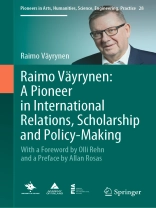This book provides a broad overview of Professor Raimo Väyrynen’s academic work, his role in international research organizations, and his contributions to policy debates. It offers an interesting review of important political issues during the time span of half a century, from disarmament in Europe to the changing relationship between state sovereignty and transnational forces. Väyrynen has dealt with the changing agenda of peace and international relations, security and the arms race, and the world economy. This book provides comprehensive analyses of the regional and systemic structure of international relations, with the emphasis on conflicts and warfare between nations. It argues that while states, even smaller ones, still matter, transnational issues are increasingly important. Taking a historical perspective, the articles suggest that large-scale violence and arms races have been recurrent and cyclical phenomena in international relations. These events reflect the deep-seated inequalities in the political and economic systems which, moreover, vary considerably between regions. The publication is important reading for any researcher as well as students, policy-makers and the science-oriented public at large.
• Traces the changing agenda of international relations from disarmament and the world economy to the changing relationship between state sovereignty and transnational forces.
• Provides analyses of the regional and systemic structure in international relations, with the emphasis on conflicts and warfare.
• Argues that large-scale violence and the arms race have been recurrent and cyclical phenomena in international relations.
• Reviews important political issues from peace and conflict in Europe to the changing power relationship in the world.
İçerik tablosu
Part I. The Author.- Chapter 1. My Journey: From the Countryside to the World.- Chapter 2. Comprehensive Bibliography.- Part II. Selection of Core Articles.- part III. A Small States and Finnish Foreign Policy.- chapter 3. On the Definition and Measurement of Small Power Status.- chapter 4. Adaptation of a Small Power to International Tensions: The Case of Finland.- part IV. The Arms Race and Warfare.- chapter 5. Domestic Crises and International Wars.- chapter 6. Capitalism, War, and Peace: Virtuous or Vicious Cycles.- chapter 7. Economy, Power, and the Arms Race.- chapter 8. Economic Cycles, Power Transitions, Political Management, and Wars between Major Powers.- chapter 9. Military Alliances, Nuclear Deterrence and Nuclear-Weapon-Free Zones.- part V. Peace and Conflict Research.- chapter 10. Peace Research between Idealism and Realism.- chapter 11. To Settle or to Transform: Perspectives on the Resolution of National and International Conflicts.- chapter 12. Complex Humanitarian Emergencies: Concepts and Issues.- chapter 13. Stable Peace through Security Communities? Steps towards Theory-Building.- part VI. International Security.- Chapter 14. International Stability and Risky States. The Enforcement of Norms.- Chapter 15. Multilateral Security: Cooperative or Collective.- Chapter 16. A Metaphor and an Incipient Doctrine.- Part VII. Globalization, Geopolitics and Global Governance.- Chapter 17. Norms, Compliance and Enforcement of Global Governance.- Chapter 18. Sovereignty, Globalization, and Transnational Social Movements.- Chapter 19. World Economy and Geopolitics: The Case of Brazil.- Part VIII. Regionalism and International Structure.- Chapter 20. Regional Conflict. An Intractable Problem of International Relations.- Chapter 21. Regionalism: Old and New.- Chapter 22. Reforming World Order: Multi- and Plurilateral Approaches.- Index.
Yazar hakkında
Raimo Väyrynen has made a significant contribution to the establishment of peace research and the promotion of research and teaching on international relations in Finland and internationally. He was a founder member of the Tampere Peace Research Institute (TAPRI) and the Secretary-General of the International Peace Research Association (IPRA).
Väyrynen has been the professor and dean at the University of Helsinki. For well over a decade he held professorial positions at U.S. universities, including the Regan Directorship of the Joan B. Kroc Institute for International Peace Studies at the University of Notre Dame and visiting positions at Princeton University, Harvard University, and MIT. He has held key leadership positions at the Academy of Finland and the Finnish Institute of International Affairs. He has made crucial contributions to science and technology policy worldwide. These activities have included the United Nations University, the European Science Foundation, and the European University Institute.












